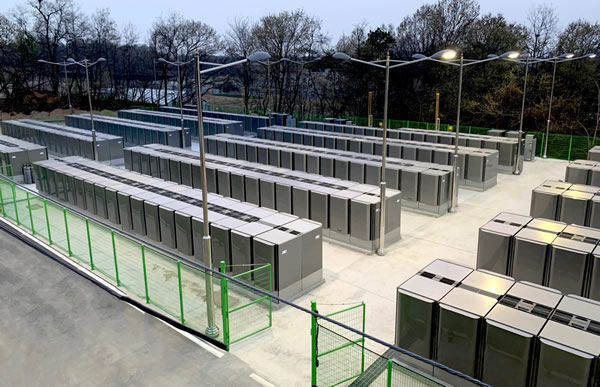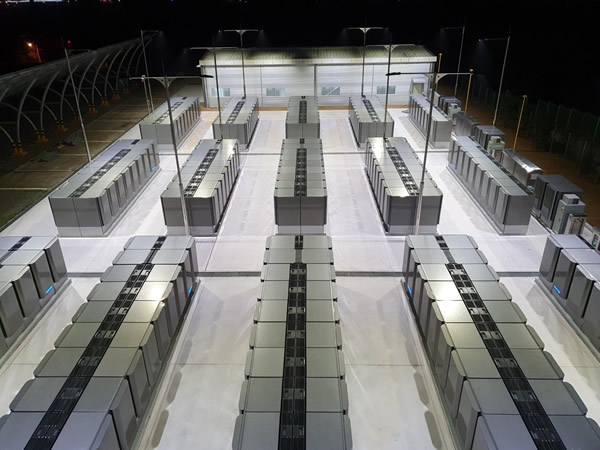Two new megawatt installations of Bloom Energy Servers to build new utility-scale, clean energy facilities in the country’s northwestern Gyeonggi province
SAN JOSE, Calif., September 2, 2020 – Bloom Energy (NYSE: BE) and SK Engineering and Construction (SK E&C) today announced they have powered on two new clean energy facilities with fuel cell technology in the Gyeonggi province of South Korea. Located respectively in the cities of Hwasung and Paju, these new installations use Bloom Energy’s non-combustion, electrochemical process to produce electricity with lower and predictable energy costs and enhanced reliability – all while reducing carbon emissions.
 The first power plant, located in the historic city of Hwasung, boasts a 19.8-megawatt fuel cell deployment of Bloom Energy Servers – the largest Bloom Energy project in South Korea to date and the company’s second largest in the world. This deployment marks the first-ever solid oxide fuel cell project financed in Korea, with over 141 billion KRW of debt and equity financing. The solid oxide fuel cell installment provides a new source of electricity to meet growing energy demand. This facility alone is designed to generate enough electricity to power approximately 43,000 homes in the area.
The first power plant, located in the historic city of Hwasung, boasts a 19.8-megawatt fuel cell deployment of Bloom Energy Servers – the largest Bloom Energy project in South Korea to date and the company’s second largest in the world. This deployment marks the first-ever solid oxide fuel cell project financed in Korea, with over 141 billion KRW of debt and equity financing. The solid oxide fuel cell installment provides a new source of electricity to meet growing energy demand. This facility alone is designed to generate enough electricity to power approximately 43,000 homes in the area.
Located in the city of Paju, the second plant consists of an 8.1 megawatt fuel cell deployment of Bloom Energy Servers designed to power nearly 18,000 homes in the area. Furthermore, the new plant not only generates clean and reliable energy for the city, it also supplies its residents in rural areas with natural gas via new city pipelines for the first time.
South Korea is a leader and global champion of fuel cell technology for utility-scale power generation. By latest estimates, its six power generation companies have deployed approximately 300 megawatts of fuel cell power to date.
This is just the beginning. South Korea has introduced several initiatives to increase power generation from renewable and new technologies. The government released a Hydrogen Economy Roadmap in 2019 calling for 15,000 megawatts of stationary fuel cells by 2040. And, South Korea’s Renewable Portfolio Standard incentivizes generation companies to increase renewable and new technology derived power to 10 percent by 2023. These energy initiatives don’t simply promote energy innovation, but also cleaner solutions and the reduction of greenhouse gas emissions.
 Solid oxide fuel cell servers, unlike other fuel cell power generators, reuse the heat they produce and do not need a heat requirement to be efficient or cost-effective, making them an option for more power users. Bloom Energy Servers have one of the highest electrical efficiency of any commercially available electric power generation system in the world, resulting in low fuel consumption – a valuable feature in a country that imports all of its gas. Additionally, the terrain and population density of South Korea make small footprint and modularly designed Bloom Energy Servers a practical energy solution for the country.
Solid oxide fuel cell servers, unlike other fuel cell power generators, reuse the heat they produce and do not need a heat requirement to be efficient or cost-effective, making them an option for more power users. Bloom Energy Servers have one of the highest electrical efficiency of any commercially available electric power generation system in the world, resulting in low fuel consumption – a valuable feature in a country that imports all of its gas. Additionally, the terrain and population density of South Korea make small footprint and modularly designed Bloom Energy Servers a practical energy solution for the country.
“South Korea is clearly on the leading-edge of our world’s energy future,” said KR Sridhar, founder, chairman and CEO of Bloom Energy. “And, this utility-scale deployment of fuel cells is a powerful proof point of its ambitious energy plan. Bloom Energy is proud to support this visionary effort to make clean, reliable, resilient, and adaptable power generation.”
“We must all be thinking about how to provide the energy needed today while also contributing to the betterment of our air and environment,” explained Jason Ahn, President and CEO of SK E&C. “Embracing technology advancements, like those from Bloom Energy, addresses energy needs and benefits to the environment and society.”
South Korea was one of the first countries heavily impacted by the COVID-19 pandemic; however, the country was successful in keeping business running, and the 19.8-megawatt installation was able to be constructed and completed during the pandemic.
In July 2020, Bloom announced plans to enter the commercial hydrogen market by introducing hydrogen-powered fuel cells and electrolyzers that produce renewable hydrogen. These products will be first introduced to the South Korean market in 2021 through an expanded partnership with SK E&C.
###
About Bloom Energy
Bloom Energy’s mission is to make clean, reliable energy affordable for everyone in the world. The company’s product, the Bloom Energy Server, delivers highly reliable and resilient, always-on electric power that is clean, cost-effective, and ideal for microgrid applications. Bloom’s customers include many Fortune 100 companies and leaders in manufacturing, data centers, healthcare, retail, higher education, utilities, and other industries. For more information, visit www.bloomenergy.com.
Bloom Energy and the Bloom Energy logo are registered trademarks of Bloom Energy Corporation.
Forward-Looking Statements under the Private Securities Litigation Reform Act of 1995
This press release contains forward-looking statements within the meaning of the federal securities laws that involve risks and uncertainties. Words such as “anticipates,” “expects,” “intends,” “plans,” “projects,” “believes,” “seeks,” “estimates,” “can,” “may,” “will,” “would” and similar expressions identify such forward-looking statements. These statements include, but are not limited to statements regarding t plans to enter the commercial hydrogen market by introducing hydrogen-powered fuel cells and electrolyzers that produce renewable hydrogen; plans to introduce these types of products into the South Korean market in 2021. These statements should not be taken as guarantees of results and should not be considered an indication of future activity or future performance. Actual events or results may differ materially from those described in this press release due to a number of risks and uncertainties, including those included in the risk factors section and other sections of Bloom’s Quarterly Report on Form 10-Q for the quarter ended June 30, 2020 and other risks detailed in Bloom’s SEC filings from time to time. Bloom undertakes no obligation to revise or publicly update any forward-looking statements unless if and as required by law.
Media Relations
Bloom Energy
T: 480.341.5464
press@bloomenergy.com
Investor Relations
Mark Mesler
Bloom Energy
T: 408.543.1743
Mark.Mesler@bloomenergy.com


